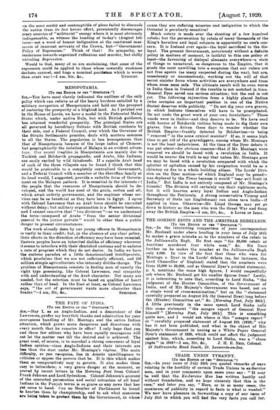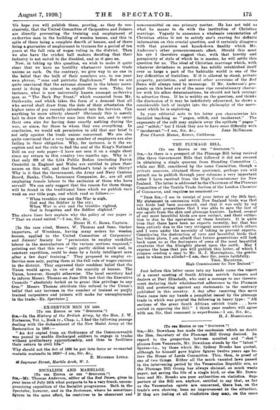TRADE UNION TYRANNY.
(To THE EDITOR OF THE "
SIR,—In your issue of July 24th you quoted remarks of mire relating to the hostility of certain Trade Unions to ex-Service men, and in your comments upon same your say : "It may be well that the Ex-Service Man has written hastily and without foundation, and we hope sincerely that this is the ease," and later you say, "Here, as in so many oases, the maximum of publicity in regard to facts is what is wanted." We now have pleasure in forwarding a copy of our issue of July 31st in :which you will find the very facts you call for.
We hope you will publish these, proving, as they do con- clusively, that the United Committee of Carpenters and Joiners are directly preventing the training and employment of ex-Service men in the building of wooden houses, and this in spite of there being a complete dearth of houses, and of there being a.guarantee of employment to trainees for a period of ten years at the full rate of wages ruling in the district. Then we also have the cricket ball makers deciding that their Industry is not suited to the disabled, and so It' goeson.
Now, in taking up this question, we wish to make it quite clear that we have no hostility whatsoever towards trade unions as such. On the contrary, we give way to no one in the belief that the bulk of their members are, to use your own phrase, "sane and patriotic Englishmen." But we are quite convinced that the extreme element in the labour move- ment is doing its utmost to exploit these men. Take, for instance, what is now universally known amongst ex-Service men as "The Back Pay Stunt," which emanated from Mr. Outhwaite, and which takes the form of a demand that all who served shall draw from the date of their attestation the higher rates of pay recently introduced into the Services. Can anything be more utterly abaurd? Obviously this is merely bait to draw the ex-Service man into their net, and to cover their own sins for having done exactly nothing during the war, or since, for those to whom they owe everything. In conclusion, we would ask permission to add that our brief is not only against the trade unions concerned. We are also quite convinced that a very large number of employers are also failing in their obligation. Why, for instance, is it the ex- ception and not the rule to find the seal of the King's National Roll on any note paper—I have not seen it on a single sheet since my return to this country two months ago. Why is jr that only 383 of the 2,514 Public Bodies (excluding Parish Councils) in England and Wales are entitled to place their names on this roll, and that Scotland's total is only thirty? Why is it that the Government, the Army and Navy Canteen Board, Banks, Clubs, Insurance Companies, &c., are all still employing female labour to the exclusion of those who have served? We can only suggest that the reason for these things will be found in the traditional lines which we publish eacn week on our title page, and which read as follows :— " When troubles rise and the Wer is nigh, God and the Soldier is the cry; When War is o'er and the troubles righted, God is forgotten and the Soldier slighted."
The above lines best explain why the policy of our paper is "That we stand united."—I am, Sir, &c.,
BENET H. C. BAIRD, Captain.
[In the case cited, Messrs. W. Thomas and Sons. timber importera, of Wrexham, having many orders for wooden houses, applied to the United Committee of Carpenters' and Joiners' Society for "permission to employ unskilled Labour in the manufacture of the various sections required," pointing out that this was "only partly skilled work and, in constant repetition, could be done by a fairly intelligent man after a few days' training." They proposed to employ ex- Service men only, paying them at the full rate of wages current in the district. They expressed their confident belief that the Union would agree, in view of the scarcity of houses. The Union, however, thought otherwise. The local secretary had to inform Messrs. Thomas on June 27th last that the Executive Councils "absolutely forbid us to grant this privilege to any firm." Messrs Thomas attribute this refusal to the Union's belief that any increase in the number of trained or partly trained carpenters and joiners will make for unemployment In the trade.—En. Spectator.]



































 Previous page
Previous page